2019-2020 County Highlights
Ticks in Maine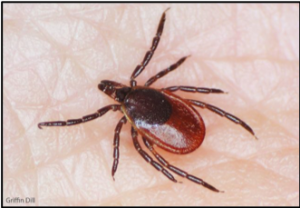
Deer ticks are on the move in the spring. They are the primary vectors of disease in Maine. Combatting the threats associated with ticks is an immense challenge that relies heavily on an integrated approach that includes monitoring tick populations, reducing tick and host habitat, managing ticks and their wildlife hosts, and widespread educational outreach on personal protection.
A free webinar sponsored by UMaine Extension on Ticks in Maine featured two speakers. Griffin Dill, IPM Professional with the UMaine Extension where he manages the Tick Lab (https://extension.umaine.edu/ticks/) and Beatrice Szantyr, MD, medical advisor for MaineLyme.
177 people registered for this event with 100 attending live and 13 viewed the recording. There were people from 11 states and two countries (Canada and India) as well as 6 folks from Piscataquis County who participated in the program. After the program, 92% of the participants indicated an understanding that the best prevention for tick-borne diseases is to avoid tick bites and 88% indicated an understanding that follow-up is important in treating a tick-borne infection.
One Tomato 2020
During COVID-19 we asked gardeners for their help in keeping everyone healthy as we distributed free tomato seedlings for the One Tomato project that the Piscataquis County Extension Association purchased from Ellis Greenhouse in Hudson. We had a short survey and contact information card for gardeners to complete when they came to pick up their seedling or they could complete it online. We asked folks to please wear a face covering and practice social distancing if they had to wait to get their seedling.
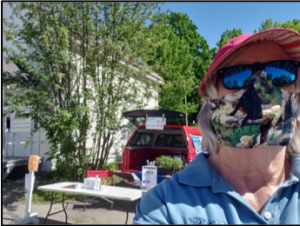 Since most of the usual distribution events that we used in previous years were canceled, we decided to reach out to people outside of grocery stores and food distribution centers. We partnered with the Dover-Foxcroft Food Cupboard and their Garden in a Box program as well as the following stores: Indian Hill in Greenville, KC Store in Parkman, Whitney’s Family Supermarket in Guilford, Tradewinds in Milo, Smith’s Grocery in Brownville. One Tomato seedlings were also available at the Dover Cove Farmers’ Market, the Piscataquis County 4-H Clubs, school gardens, and at the Extension Office in Dover-Foxcroft.
Since most of the usual distribution events that we used in previous years were canceled, we decided to reach out to people outside of grocery stores and food distribution centers. We partnered with the Dover-Foxcroft Food Cupboard and their Garden in a Box program as well as the following stores: Indian Hill in Greenville, KC Store in Parkman, Whitney’s Family Supermarket in Guilford, Tradewinds in Milo, Smith’s Grocery in Brownville. One Tomato seedlings were also available at the Dover Cove Farmers’ Market, the Piscataquis County 4-H Clubs, school gardens, and at the Extension Office in Dover-Foxcroft.
We distributed a total of 480 seedlings at ten locations throughout the county. Many families were able to receive tomato seedlings for all members in their household. A total of 273 initial surveys were completed and 19 % of those receiving the seedlings had never gardened before, this was their first year, or this was their first-year gardening in a long time. 39% are planning to grow their tomatoes in a container. 27% had not heard of the University of Maine Cooperative Extension before. 75% of folks receiving a seedling had never participated in the One Tomato project before.
Garden in a Box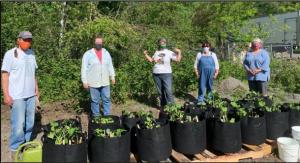
UMaine Extension Master Gardener program joined forces with the Piscataquis County Regional Food Center to pilot a “Garden in a Box” program for people with an interest in growing their own food but didn’t know where to begin. Other more experienced gardeners who didn’t have space or physical capability to tend to a big garden also participated.
The Garden in a Box pilot program was designed as a learning series with a few different components. Participants were provided with all the materials they needed for a container garden but plans for monthly meetings were adapted due to COVID-19. With grant funding from the Quimby Family Foundation, 14 participants received the planted 15-gallon containers with locally grown seedlings from the Ripley Farm and Marr Pond Farm that were delivered to their homes. Garden Coaches were available by phone for questions.
Delivering the containers to gardeners, and seeing how excited everybody was about their plants, was amazing to see! We know that these little container gardens will spark happiness, learning, and connectivity for the first-ever Garden in a Box participants!
4-H YOUTH DEVELOPMENT |
Welcome to New 4-H Community Education Assistant,
Emily Mott
We are very pleased to announce that Piscataquis and Penobscot Counties have a new 4-H Community Education Assistant. Emily Mott joined our staff in December. She comes to us from the University of Massachusetts with a degree in Kinesiology. Emily’s skill with spreadsheets and technology has been greatly appreciated in her highly unusual first year with 4-H. Her interests include board games, music, and a growing affection for cats.
4-H Activities
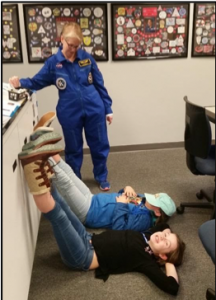 As with organizations everywhere, this year has been very challenging for our 4-H clubs, members, volunteers, and staff. The year began with all our traditional activities and plans, but the COVID 19 outbreak changed everything. Here are some of the highlights of our most unusual year.
As with organizations everywhere, this year has been very challenging for our 4-H clubs, members, volunteers, and staff. The year began with all our traditional activities and plans, but the COVID 19 outbreak changed everything. Here are some of the highlights of our most unusual year.
Our long-running Milo Afterschool program met as usual in the fall of 2019. One group created items from duct tape and the other learned about space travel and flight. Twenty-two youth participated in the culminating event, a field trip to the Challenger Space Center in Bangor and the Emera Planetarium at UMaine. Our spring session was canceled after only two meetings due to the pandemic.
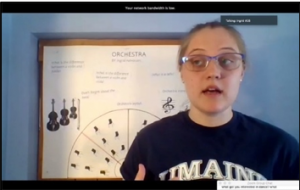 Public Speaking
Public Speaking
Two youth participated in our county public speaking tournament. Ingrid and Susannah both qualified for the state tournament, which was held virtually by ZOOM. Ingrid earned a spot on the Communication Science Team. Volunteer and former 4-H public speaker Rebecca Huettner served as a judge and committee member. Piscataquis County Executive Committee members also served as judges and timekeepers. Staff members Sheila and Emily both held leadership positions on the planning committee.
Sew Much Fun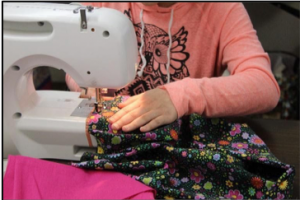
Sew Much Fun, a Special Interest 4-H Club, met at the Piscataquis County Extension office in February. Ten members learned quilting techniques from leaders Sally Downing and Barbara Lockwood. Members created beautiful pillowcases and coasters. There was so much interest in this SPIN club that a second session was planned for April, but it had to be postponed.
National Trips
We are happy to announce that two youth from Piscataquis County was selected to represent Maine on national trips. Gabrielle attended National 4-H Congress in Atlanta, GA in November. Trisha Smith served as a chaperone for the trip. Ingrid was selected to attend National 4-H Conference in Washington, D.C., but that trip was postponed. She will attend with next year’s delegation in 2021. Congratulations to both girls!
Virtual Meeting and Programs
In recent months, all activities have been virtual. The Super Science club has been meeting by ZOOM. The summer learning series features 50 on-line opportunities for youth to engage with staff, volunteers, and other kids from all over the state. Gabrielle and Susannah will offer a workshop on how to make goat milk soap and Rebecca Huettner will offer an introduction to public speaking as part of the series. Sheila and Emily serve on the leadership team of this event also.
County Fair Postponed
The Piscataquis Valley Fair, where 4-H is proud to showcase our activities and where we have our major fund-raiser of the year, has been postponed until 2021. UMaine Extension staff across the state are initiating new opportunities for 4-H youth to be recognized for their project work.
4-H clubs in Piscataquis County
We have 60 youth members and 11 volunteers enrolled.
- Super Science – Monson/Guilford (leader Gretchen Huettner)
- Wild Blueberry Adventures Club – Greenville (leader Ruth Huettner)
- 4-H After School – Brownville (leaders Nancy Paprocki, Ellen MacMillan, Kim Haffenreffer, and staff)
- Sew Much Fun SpIn – Dover-Foxcroft (leaders Barbara Lockwood and Sally Downing)
- Piscataquis Passport- Dover-Foxcroft (leaders Susan Stevens and Trisha Smith)
- Choose Health-Food, Fun, and Fitness SpIn-Guilford (staff)
- Independent membership is also available
COMMUNITY AND ECONOMIC DEVELOPMENT |
COVID-19 Response in Piscataquis County
On March 19th the decision was made for UMaine Extension staff to leave the office and work from home. Live in-person programs were quickly converted to virtual programs or meetings. Clients without Internet access were contacted by phone, surface mail, and newspaper articles.
Piscataquis County staff were involved in a number of efforts that had county as well as statewide  impact. Virtual programs included Garden in a Box, Fourth Friday Plant Clinics, Growing and Utilizing Hemp in the Home Garden, Garden Chats: Growing Resilience from the Ground Up, Victory Gardens for ME, and the Weekly Maine Farm Zoom. The farm zoom session featured a number of special guests including Congresswoman Pingree, Commissioner Beal, and Senator Collins to discuss COVID-19 response for agriculture producers.
impact. Virtual programs included Garden in a Box, Fourth Friday Plant Clinics, Growing and Utilizing Hemp in the Home Garden, Garden Chats: Growing Resilience from the Ground Up, Victory Gardens for ME, and the Weekly Maine Farm Zoom. The farm zoom session featured a number of special guests including Congresswoman Pingree, Commissioner Beal, and Senator Collins to discuss COVID-19 response for agriculture producers.
Local staff were also involved in developing and up-dating farm-oriented websites on the UMaine Extension server. A new site E-commerce and Alternative Marketing Methods for Farmers was posted. A revised Small Ruminant site was made more robust for small-scale sheep and goat keepers. The Poultry website was revamped with more current information for new and small-scale poultry keepers. An additional factsheet Nutrition for Backyard Poultry Flocks in Maine was added.
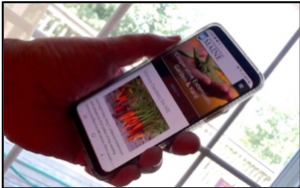 Piscataquis Media Survey
Piscataquis Media Survey
Last year we asked for your help to make us more effective with our program content and efficient in our communication methods by completing the Piscataquis Media Survey. Here are the results.
We had 290 responses with 32% from Piscataquis County, 39% from Penobscot County, and 29% from another county. Piscataquis County residents want to receive vegetable gardening information (68%), food preservation information (57%), plant identification assistance (52%), pest identification assistance (50%), and farming information (49%.) Other topics of interest included: 4-H & Youth, calendar of events, food preparation, greenhouse information, home landscaping, and pest management.
People in Piscataquis County prefer to get information from UMaine Extension through email (69%), e-newsletters & website (57%), live classroom instruction (46%), and surface mail (41%). They also like to access information by text, one on one consultations, Facebook, and webinars.
Piscataquis County residents access information technology by laptop computer (58%), smartphone (54%), desktop computer (42%), cell phone (38%), and highspeed cable (37%). They also use tablets, phone landlines, local libraries, and satellite Internet to access online information.
Internet access in Piscataquis County is not as available nor fast as access in other areas of Maine. 84% of Piscataquis County households have access to 25+ mbps (megabits per second) while an average of 95% of all Mainers have this speed available. Only 42% of Piscataquis households have access to 100 mbps with an average of 92% of all Mainers have this faster speed. 72% of Piscataquis have broadband access with the average Maine broadband at 87%.[1]
[1] Cooper, Tyler. “Internet Access in Maine: Stats & Figures.” Broadband Now. Broadband Now, 06 Feb. 2020. Web. Accessed 15 Jun. 2020. <https://broadbandnow.com/Maine>.
